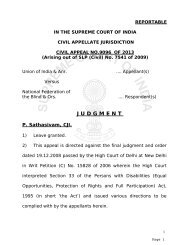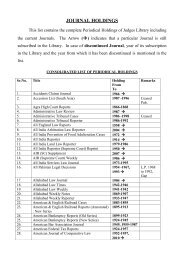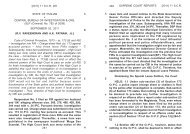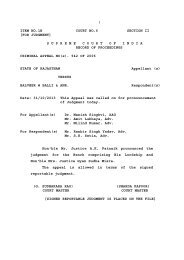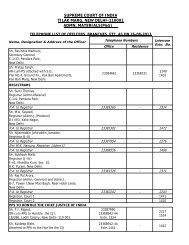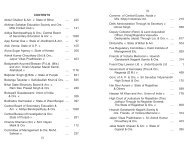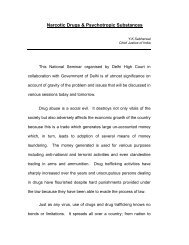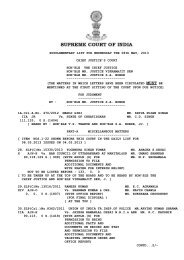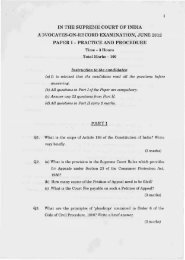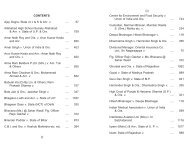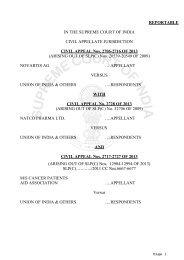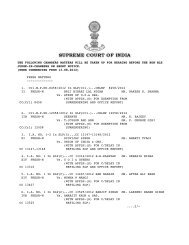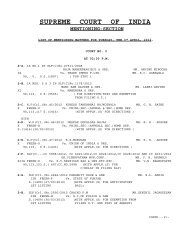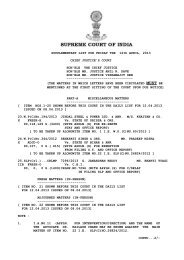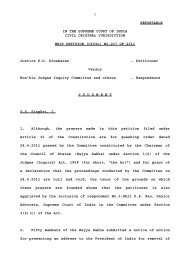Part No.IV - Supreme Court of India
Part No.IV - Supreme Court of India
Part No.IV - Supreme Court of India
Create successful ePaper yourself
Turn your PDF publications into a flip-book with our unique Google optimized e-Paper software.
MAHADEV GOVIND GHARGE v. SPL. LAO UPPER KRISHNA<br />
PROJECT JAMKHANDI, KARNATAKA<br />
a ‘hearing’ by the <strong>Court</strong> – Necessary ingredients <strong>of</strong> ‘hearing’<br />
thus are application <strong>of</strong> mind by the court and address by the<br />
party to the suits.<br />
Procedural law – Purpose and interpretation <strong>of</strong> – Held:<br />
Justice between the parties to a case is the essence <strong>of</strong><br />
procedural law – Unless the statute expressly prohibits or put<br />
an embargo, the <strong>Court</strong>s would interpret the procedural law so<br />
as to achieve the ends <strong>of</strong> justice – Strict construction <strong>of</strong> a<br />
procedural law is called for where there is complete<br />
extinguishment <strong>of</strong> rights, as opposed to the cases where<br />
discretion is vested in the courts to balance the equities<br />
between the parties to meet the ends <strong>of</strong> justice which would<br />
invite liberal construction – The provisions <strong>of</strong> procedural law<br />
which do not provide for penal consequences in default <strong>of</strong> their<br />
compliance should normally be construed as directory in<br />
nature and should receive liberal construction.<br />
A preliminary notification under section 4(1) <strong>of</strong> the<br />
Land Acquisition Act, 1894 was issued for acquisition <strong>of</strong><br />
land. The Special Land Acquisition Officer awarded<br />
compensation. Aggrieved, the claimants-landowners filed<br />
references under section 18 <strong>of</strong> the Act. The Reference<br />
<strong>Court</strong> enhanced compensation along with all statutory<br />
benefits. The respondents filed appeal before the High<br />
<strong>Court</strong> on 12.09.2001. The landowners were on a caveat.<br />
The High <strong>Court</strong> admitted the appeal on the same day and<br />
directed the <strong>of</strong>fice to post the same for hearing after the<br />
LCR were received. The appellants filed cross-objections<br />
before the High <strong>Court</strong>, under Order XLI, Rule 22 <strong>of</strong> CPC,<br />
along with an application for condonation <strong>of</strong> delay <strong>of</strong> 404<br />
days in filing the cross-objections.<br />
The High <strong>Court</strong> dismissed the appeal <strong>of</strong> the State and<br />
also held that the landowners were entitled to interest<br />
with effect from the date <strong>of</strong> the award. Against the said<br />
judgment, the State came up in appeal before this <strong>Court</strong>.<br />
831 832<br />
A<br />
B<br />
C<br />
D<br />
E<br />
F<br />
G<br />
H<br />
A<br />
B<br />
C<br />
D<br />
E<br />
F<br />
G<br />
H<br />
SUPREME COURT REPORTS [2011] 8 S.C.R.<br />
The High <strong>Court</strong> also dismissed the cross objections<br />
filed by the landowners. The High <strong>Court</strong> held that it was<br />
clear that on 12.9.2001 itself, the <strong>Court</strong> thought it<br />
appropriate to hear the appeals out <strong>of</strong> turn and<br />
accordingly directed the <strong>of</strong>fice to post the appeal for<br />
hearing immediately after the records are received and<br />
that the cross objections were not filed either within one<br />
month from the date <strong>of</strong> fixing the date <strong>of</strong> the appeal or<br />
from the date the records <strong>of</strong> the lower court were received<br />
by the registry <strong>of</strong> the court and therefore, the cross<br />
objectors’ contention based on the provisions <strong>of</strong> Order<br />
XLI Rule 22(1) CPC was misconceived and untenable. The<br />
High <strong>Court</strong> further held that the explanation <strong>of</strong>fered by the<br />
cross objectors for the delay <strong>of</strong> 404 days was vague and<br />
did not amount to sufficient cause so as to condone the<br />
delay. Against the dismissal <strong>of</strong> cross objections, the<br />
landowners-cross objectors approached this court by<br />
filing Civil Appeal.<br />
The landowners contended before this court that (i)<br />
the limitation period <strong>of</strong> one month, prescribed under<br />
Order XLI Rule 22, would not begin to run till an actual<br />
date was fixed for hearing by the High <strong>Court</strong> and notice<br />
<strong>of</strong> it was served on the cross objectors, i.e. landowners;<br />
ii) that powers <strong>of</strong> an appellate <strong>Court</strong> are very wide under<br />
Order XLI Rule 33 and relief could be granted to the<br />
landowners even under the said provision; iii) that the<br />
landowners had shown sufficient cause for the delay and<br />
iv) that land <strong>of</strong> the landowners was compulsorily acquired<br />
and the court was duty bound to award just<br />
compensation to the landowners.<br />
Disposing <strong>of</strong> the appeals, the <strong>Court</strong><br />
HELD:1.1. The Code <strong>of</strong> Civil Procedure, 1908 (CPC)<br />
is a law relating to procedure and procedural law is<br />
always intended to facilitate the process <strong>of</strong> achieving the<br />
ends <strong>of</strong> justice. The <strong>Court</strong>s would normally favour the



